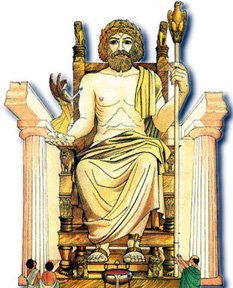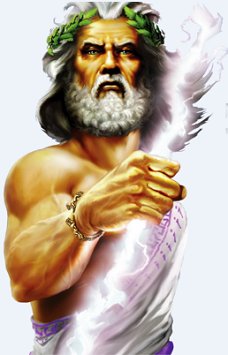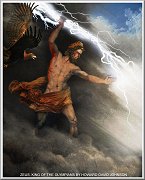MYTH MAN'S AWARD-WINNING HOMEWORK HELP
MIGHTY ZEUS - KING OF THE OLYMPIANS
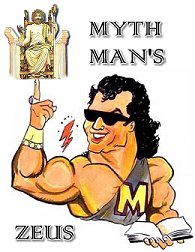
LATIN - JUPITER, JOVE
PAGE TWO
AN INCREDIBLE AMOUNT OF INFO!
He became the undisputed master of the universe, and as the god of rain, drought, storms - in short, all good and bad weather - he was worshipped as the source of all heavenly manifestations.
He commanded tempests and created storms, and kept peace and order among the quarrelsome family of Olympians through the use of his fearsome thunderbolts, which nobody dared to challenge, god or mortal.
He is known by many titles, including: Lord of the Sky, God, the Cloud-gatherer, Zeus of the Thunderbolt, the Sky Dweller, the Rain-god and Zeus the Thunderer.
The many names of Zeus indicate which force of nature was considered to be the most important in Ancient Greece - Rain. In quite a few other mythologies the reigning deity was usually a Sun God, but in Greece the climate is hot and dry making rain the scarce, life-giving force.
Zeus was the sixth child born to the Titans Cronus and Rhea. Cronus, ruler of the Titans and the supreme god at the time, was warned by an oracle that one of his own children would overthrow him, just like he overthrew his father, Uranus. To prevent this from happening he swallowed his first five children as each was born to Rhea.
These five children who were imprisoned in their father Cronus' belly were Poseidon, Hades, Hera, Demeter and Hestia. One by one Cronus swallowed each of his babies as Rhea presented them to him.
Needless to say, seeing her children eaten by her husband infuriated Rhea and when Zeus was born she tricked Cronus into swallowing a rock wrapped in blankets. Cronus foolishly swallowed the stone and thought himself safe.
Then Rhea sent the baby to Gaea (Mother Earth) who secretly took Zeus to be raised on the island of Crete, in a cave at a place called Dicte, away from his unsuspecting father.
There the ash nymph Adrasteia and her sister Ide were placed in charge of his care. They guarded the child in the cave and tried to prevent Cronus from discovering his existence.
The ash nymphs took great pains to safeguard the baby. On occasion they even hung Zeus in a cradle from a tree, so that he could be found neither in heaven nor on earth nor in the sea and, gathering youths, gave them brazen shields and spears and asked them to go around the tree clashing their shields and making noise lest the cries of little Zeus be heard.
These Curetes, as his early attendants were called, were assisted in the upbringing of Zeus by the divine goat Amaltheia, which means "tender". He suckled on Amaltheia's milk and when the goat died to honor it Zeus turned her skin into his Aegis, which he used as a protective shield.
When he grew a little older Zeus tricked his way into becoming the cup-bearer to his father Cronus and with the help of his mother Rhea and the Titaness Metis he slipped his father a drink which made him disgorge the swallowed siblings of Zeus. They were unharmed because they were gods.
Knowing that he would need allies and weapons if he were to overthrow his father, Zeus next freed the Cyclopes from Tartarus, a terrible place in the Underworld where Cronus had imprisoned them, and they gratefully gave him his famous thunderbolts as a gift.
To his brother Poseidon they gave a trident, which he used to shake the earth and sea in much the same fashion as Zeus did his thunderbolts, and to Hades the Cyclopes gave a helmet which, when worn, rendered the person invisible. Cool gifts!
Properly armed and with a formidable army at his command, Zeus and the other children of Cronus attacked their father, assisted by the Cyclopes and the Hecatonchires, which means One Hundred Handed Ones.
It was a furious battle against Cronus and his fellow Titans but at last Hades, wearing his helmet of invisibility, snuck up behind Cronus, Poseidon rendered him immobile with his trident, and Zeus struck him senseless with his thunderbolt. Thus ended the reign of Cronus and the Titans.
Since the Olympians and their parents could not die, Zeus banished Cronus to a distant island in the Atlantic Ocean. That island could be the Azores, or even Torrey Island, off the coast of Ireland. Other accounts have the Titan going to Italy or even being imprisoned in Tartarus.
Eventually Cronus managed to escape from this island prison and made his way in a small boat to Italy, where he changed his name to Saturn and settled quietly among the Italians.
The reign of Cronus while there became known as the Golden Age, and mortals in Italy lived without work or trouble, feasting on acorns, honey, wild fruit and pig-nuts, and drinking only milk and water. Wars were unheard of and their days were spent dancing and singing without care.
But back to the victors in the Titanomachy, as the Battle of the Titans versus the Olympians was called...The three brothers then drew lots to split the spoils of victory and determine who gets what. Zeus drew the heavens and became supreme ruler, Poseidon became the god of the sea and Hades the ruler of the Underworld.
The Earth was common to all three reigning gods, and they all held power over its creatures.
The gigantic, one-eyed Cyclopes, who had helped Zeus in his battle against Cronus and his cronies, then honored Zeus by building a splendid and majestic palace at the topmost peak of Mount Olympus, the highest mountain in Greece.
This enormous palace, set well above the clouds at the top of Mount Olympus, was built on much the same plan as royal palaces on earth. It featured great and impenetrable walls, too steep to climb.
The living quarters of Zeus and his wife Hera were at the southern end, just behind the Council Hall, and overlooking all the famous cities in Greece, including Athens, Sparta, Thebes, Corinth, Argos and Mycenae. It was a majestic view.
Description of the Throne of Zeus
by Robert Graves

Following info courtesy of
Robert Graves'
Greek Gods and Heroes
After assuming leadership of the Olympians and becoming supreme ruler, Zeus got a little too full of himself and did some wild things, which often made his fellow gods angry.
Among them was his decision to pursue and marry Metis, who had helped him trick Cronus into disgorging his siblings. She wasn't too keen to marry Zeus and changed her form to escape him. Not to be outdone, he changed his shape right along with her and relentlessly pursued her until finally she tired and agreed to marry him.
Gaea, Mother Earth, then warned that any son born of the union of Metis and Zeus would grow up to overthrow his father, so Zeus decided to swallow Metis to prevent this from happening.
In time Zeus developed a "splitting" headache and shortly thereafter the great goddess Athena was born from his head. The god of the forge and smiths, Hephaestus, seeing the discomfort that his King Zeus was in, took an axe and sliced open the head of Zeus, relieving his pain and bringing forth Athena.
Athena was dressed in a robe that Metis had created while trapped inside Zeus, and the goddess of Wisdom was carrying a splendid shield and spear (No wonder Zeus had a headache!) She came into being shouting a war cry that was heard on heaven and earth.
Thus rid of his first wife, Zeus next set his sights on his sister Hera. Like Metis, she wanted nothing to do with him. Knowing that he needed drastic measures to get near Hera, Zeus transformed himself into a sad and bedraggled looking cuckoo bird, soaked from a strong downpour. Hera cast one look at this pitiful bird and held him to her heart, so as to warm him. That's when Zeus turned back into his regular awesome form and ravished Hera, who was helpless in his arms.
They married and thus was formed the union of King Zeus, the Father-god, and Queen Hera, the Mother-goddess. Their royal honeymoon was said to have lasted 300 years!
But Zeus was impulsive and arrogant when he was a young ruler, and eventually the other Olympians tired of his antics and conspired to revolt against his reign.
Hera, Poseidon and Athena, along with other Olympian conspirators, trapped Zeus and bound him in his throne, taking away his fearsome thunderbolts and rendering him helpless.
But while the Olympians were arguing among themselves as to who the next ruler would be, the Titaness Thetis summoned Briarius, one of the hundred-handed Hecatonchires, who released Zeus and returned his thunderbolts. It goes without saying that the mutinous Olympians were in for a rude surprise when King Zeus showed up in the midst of their argument, looking for paybacks!
Poseidon and Hermes were treated as minor conspirators by Zeus and they swore and oath never to challenge his rule again. To punish them he banished them to earth for one year, where they had to serve a mortal king as common labourers.
Zeus wisely chose not to punish his favorite daughter, Athena, saying that she played a reluctant part in the palace revolt.
But Zeus saved his sternest punishment for his wife Hera, the leader of the uprising. He strung her from the heavens using a fine, unbreakable silver thread and to further torment her he tied two huge and heavy anvils from each of her feet. Talk about pain!
For four days she hung suspended and none of the other Olympians dared come to her aid, fearing for their own welfare. They knew not to mess with Zeus when he was enraged like that, as sorry as they felt for Hera.
But Zeus had finally had enough, for her moans and groans kept him awake at night. After making her promise in an unbreakable oath that she would honor and respect him forever, he set her free. He did truly love her, after all, regardless of her attempt to overthrow him.
It should be noted that Hera truly loved her husband, even though she was insanely jealous of his countless affairs.
Eventually Zeus settled down and matured, becoming a good and generous god who rewarded just behavior and punished those who performed evil. He became wise and magnanimous and his rule was worshipped and rejoiced throughout the universe.
There were a couple more challenges to the rule of Zeus, including the Alodae (Aloads), who were two mythical giants, Otus and Ephialtes. These brothers amazingly grew every year a cubit in breadth and a fathom in height and when they were only nine years old they were 54 feet high.
The Alodae figured that they could breach Mount Olympus by building a bridge of mountains up to it, so they tried to pile Mt. Pelion upon Mt. Ossa upon Mt. Olympus. They attempted to make the sea dry up by filling it with mountains, and to turn the mountains into sea. However, before they could do so, the brothers were slain by Apollo's arrows.
Next came the challenge of the Giants. These were huge creatures with a thousand hands and serpents for feet, created by Gaea (Mother Earth) because she was angry at Zeus for defeating her children, the Titans, and imprisoning them at Tartarus. They also attacked Olympus and an oracle had foretold that no god could kill them, but a mortal could. Heracles (Hercules), son of Zeus by a mortal woman, came to his father's assistance and slew the Giants.
Well, you know that didn't sit well with Gaea, who now was more mad than ever. She mated with Tartarus and a fearsome monster was born, by the name of Typhon (Typhoon). This horribly ugly beast had human shape but from the thighs downward he had huge coils of snakes, one hundred miles long, which when drawn out, reached to his very head and emitted a loud hissing.
Typhon was taller than the mountains and his head brushed the stars, his hissing hands horrible to behold. When the Olympians saw Typhon approaching their palace they recoiled in fear and changed their shape into animals, running away to hide in Egypt.
Only brave Athena stood her ground and she goaded and made fun of Zeus, calling him a coward and trying to spur him to face his attacker. Zeus finally regained his courage and returned to fight Typhon. A battle to end all battles ensued, with both participants sustaining serious damage and the earth shaking from their mighty blows.
At last Typhon picked up tall Mount Aetna, in Sicily, to hurl at Zeus and that's when the King of the Olympians unleashed one hundred perfectly-thrown thunderbolts at the monster. The mountain crumbled from the mighty thunderbolts, burying Typhon underneath it.
Typhon was never seen again, but occasionally one can hear him rumbling, deep down below the surface of Mount Aetna.
Zeus is more powerful than any other god or even all the other gods combined. But, unlike many gods in other religions he was neither all-powerful nor all-seeing. He could be, and in fact was, opposed, deceived and tricked by gods and men alike.
His power, although great, was not boundless. For example, Zeus had no control over The Three Fates and destiny. It was said that when the Fates spoke, even Zeus listened, for they alone could decide the path of gods and mortals alike.
Like all Greek divinities, Zeus was subject to pleasure, pain, grief, and anger, but he was most susceptible to the power of Eros (Love), which often got the objects of his desire in a lot of trouble with his wife, Hera. Since she couldn't punish Zeus, she took out her anger on the women.
The representation of Zeus was a most noble one - mighty, glorious, often kind, awesome and wise, although he did show a certain degree of surprising foolishness and naïveté when it came to hiding his love affairs.
Some historians attribute this less than noble behavior of the "noblest one of all" to the fact that Zeus was most likely a compilation of many "supreme gods" from different areas. When his worship spread to an area which already worshipped another god, some of the previous god’s qualities as well as his wife or lover were transferred to Zeus.
Aside from the endless affairs Zeus was different from other gods in that he did not participate in the arguments and the resulting petty scheming that made up the daily activities of other gods. Being this wise ruler, he also demanded just and righteous action from men.
Zeus was however vengeful, as can be seen in the punishment of Prometheus. For stealing fire from Olympus and giving it to mortals, Zeus sentenced Prometheus to be forever tied to a rock, and an eagle would come daily and feast on his liver. It was not until many years later that Heracles (Hercules) would come and kill the eagle, freeing Prometheus.
Zeus had two special attendants, Nike (Victoria), the goddess of victory, and his cup-bearer, Hebe, who was one of his numerous daughters. After Hebe married Heracles, Ganymedes replaced her as the cup-bearer for Zeus. Zeus had seen the boy Ganymedes and had become captivated by his beauty. He either sent his eagle, or assumed the form of an eagle himself, and kidnapped the boy. He was brought to Mount Olympus where he became his personal cup-bearer.
In Roman Mythology, Zeus’ counterpart, Jupiter, was also attended by Fama (fame) and Fortuna (luck and chance, Tyche in Greek).
The Nine Muses would sit by his throne and sing sweetly of his glory, as he feasted on nectar and ambrosia, the food of the gods.
His strongmen were Force and Violence, who lived up to their names. The messenger god Hermes was often the accomplice of Zeus in his various escapades.
Zeus was the guardian of political order and peace. The Aegis is his shield and breastplate, fashioned from the skin of the divine goat Amalthea - so glorious and at the same time awful to behold that no human could see Zeus in all his magnificence and survive.
His favorite daughter Athena eventually was given the Aegis by Zeus. Athena had sprung full-grown from his head and was the only Olympian whom Zeus permitted to use his thunderbolts, his favorite weapon which he hurled at whoever displeased him.
Zeus is identified with his bird, the Eagle. His tree is the Oak. A place called Dodona was the seat of his oracle. His will was revealed by the rustling of oak leaves which was interpreted by his priests.
The flying horse Pegasus, once it came to Olympus, would often retrieve his thrown thunderbolts, same as Zeus' royal eagle.
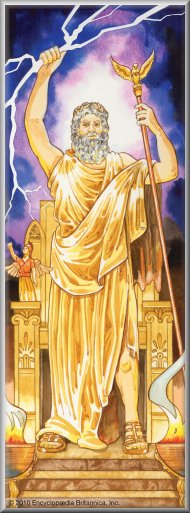
ZEUS' NAMES
God
Zeus of the Aegis
Zeus the cloud gatherer
Zeus of the wide brows
Father Zeus
Son of Cronus
Lord of Hera
Zeus of the thunderbolt
Father of gods and men
The Olympian
Zeus on high
The sky dweller
Lord of the Sky
The Rain-god
Zeus the Thunderer

CLICK HERE FOR
ZEUS FAMILY TREE

[HOME] [MYTHOLOGY'S
EFFECTS ON MODERN SOCIETY][OLYMPIANS]
[GALLERY] [MAJOR
GODS] [MINOR
GODS] [HEROES]
[CONTACT]
[LOVE STORIES]
[MYTH OF THE
MONTH] [FUN
STUFF] [CREATURES]
Web, myth narration and graphics created
and maintained by Nick Pontikis
Copyright © 1995 - 2013 Nick Pontikis
Thanasi's Olympus Greek Restaurant
Copyright 1999
mythman.com
greekmythologytoday.com
mythmaniacs.com
The Myth Man persona copyright 1988 Nick Pontikis
